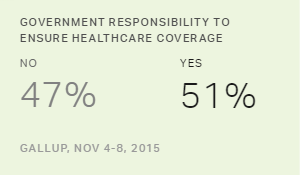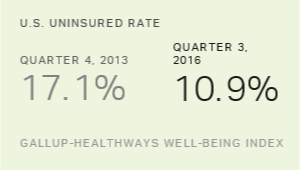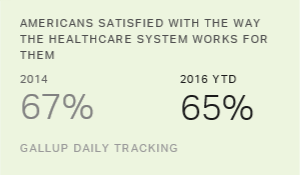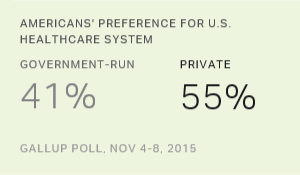WASHINGTON, D.C. -- Healthcare is one of the major policy issues facing the next president and has been a significant topic of debate in this year's presidential campaign -- particularly regarding the future of the Affordable Care Act. A Gallup review of aspects of American public opinion on healthcare shows that Americans are generally happy with their own healthcare and more negative than positive about the Affordable Care Act. Americans are leery of federal involvement in running healthcare but don't reject the idea of a single-payer healthcare system. Most Americans do not perceive that healthcare is in a crisis, although it is an important issue to most.
Majority of Americans OK With Personal Healthcare Situation
In each of the past 15 years, a substantial majority of Americans have rated the quality of their personal healthcare as either excellent or good. These attitudes have become slightly less positive, but 76% remain positive about the quality of their healthcare in Gallup's most recent update in November 2015.
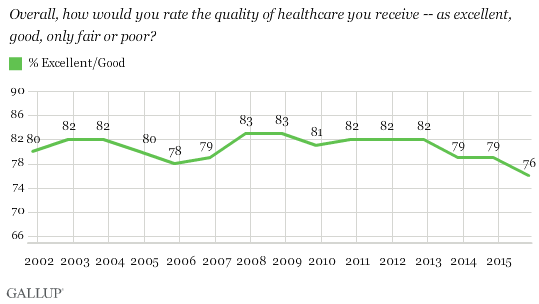
A majority of Americans are positive about other aspects of their personal healthcare as well:
- About two-thirds of Americans (67%) rate their healthcare coverage as excellent or good.
- Fifty-seven percent say they are satisfied with the cost of their healthcare. Neither the coverage nor the cost ratings have changed substantially, including in the years after the introduction of the Affordable Care Act.
- Sixty-seven percent of Americans say they are satisfied with the way the healthcare system is working for them.
In contrast, Americans are significantly less positive when asked to rate healthcare at the national level. A little more than half of Americans (53%) rated the overall quality of the nation's healthcare as "excellent" or "good" in November 2015 -- tied as the lowest reading in Gallup's 15-year history of asking the question.
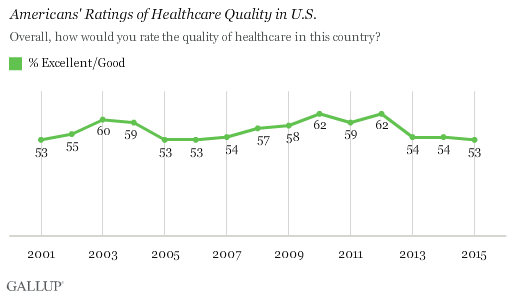
Americans' assessments of national healthcare coverage and cost are also substantially worse than comparable ratings of their own personal situations.
Healthcare Important to Americans, but Not a Crisis
Although Americans don't see healthcare as a crisis at this point and don't name it as the most important problem facing the country, it is still seen as important based on other measures:
- A relatively low 16% of Americans said in Gallup's November 2015 update that the healthcare system is in a state of crisis, although a majority (56%) say that it has major problems.
- Only 3% of Americans mention healthcare as the most important problem facing the nation in Gallup's latest monthly update. Mentions of healthcare as the most important problem have been much higher at other points.
- At the same time, a May Gallup election benchmark study included healthcare in a list of issues Americans rated based on how important the issue will be in influencing their presidential vote. "Healthcare and the Affordable Care Act" was among the top five issues rated, with 83% saying it was "extremely" or "very important." "The economy" was at the top of the list, at 92%.
- Another question in the same study asked Americans to name the most important priority for the next president to address. Healthcare (including healthcare cost and reform) was the third-most-frequently mentioned issue, behind only the economy and immigration.
Healthcare Industry Overall Has a Bad Image
Fifty-four percent of Americans have a "very" or "somewhat negative" view of the healthcare industry. This represents a nine-point jump from 2015 and is the most negative reading since 2011.
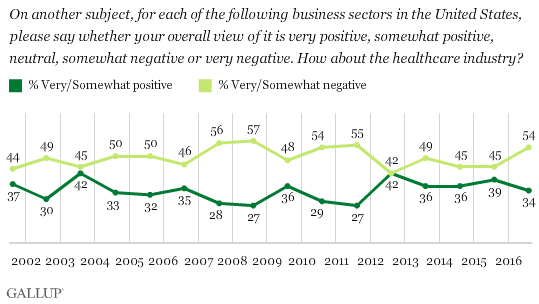
The healthcare industry has the third-lowest rating out of 25 business sectors measured this year, ahead of only the pharmaceutical industry and the federal government (both with a 28% total positive rating).
Mixed Opinions on Role of Federal Government in Healthcare
Americans are essentially split when asked if it is the responsibility of the federal government to ensure that all Americans have healthcare coverage -- 51% say that it is, while 47% say that it is not. These attitudes have shifted over time. In the years before Barack Obama became president, a large majority at times said it was the government's responsibility.
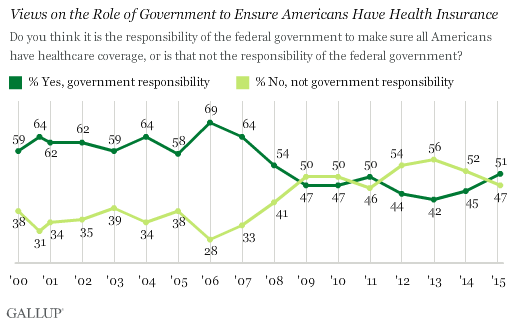
Another Gallup question shows that, given a choice, Americans prefer a privately run healthcare system to one run by the government, by 55% to 41%.
These attitudes are not necessarily contradictory. Under the current Affordable Care Act, the government can mandate that all Americans have healthcare coverage, even if that coverage is provided by a private insurance system. Still, taken together, these results show that the American public is, in a general sense, not predisposed to the idea of the federal government running healthcare.
Americans More Negative Than Positive About Affordable Care Act
These general attitudes are mirrored when Americans are asked to evaluate the Affordable Care Act. Forty-four percent surveyed in Gallup's most recent update approve of it, compared with 51% who disapprove. The public's approval of the healthcare law has consistently been below the majority level in recent years, ranging from a high of 48% shortly after Obama won re-election in 2012 to a low of 37% approval in late 2014.
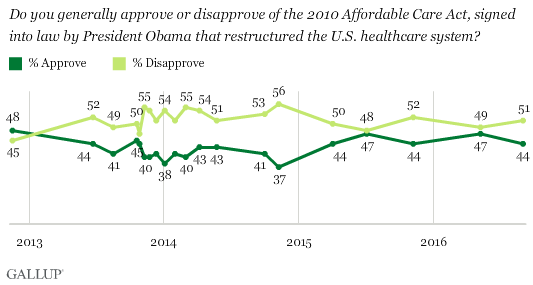
The slightly more negative attitudes toward the Affordable Care Act are echoed in a separate Gallup question asking if the healthcare law so far has helped or hurt the healthcare situation in the U.S., or if it has had no effect. Forty-five percent of Americans now say that it hurt the healthcare situation and 37% say it helped it, with the rest (12%) saying it had no effect.
The Affordable Care Act's Future
The 2016 presidential campaign has highlighted rancorous partisan debate on the future of the Affordable Care Act. While campaigning in the Democratic primaries, Bernie Sanders advocated for a single-payer "Medicare for All" system. Hillary Clinton says she would preserve the current healthcare law but make changes to fix its problems. Donald Trump vows to repeal "Obamacare" outright and replace it with a "series of reforms ready for implementation that follow free market principles and that will restore economic freedom."
Americans' views about what to do with the Affordable Care Act reflect the complexity of the law and the varied ideas about how to deal with it. Earlier this year, Gallup asked Americans about three possible actions:
- A majority of Americans (58%) said they favored repealing the healthcare law and replacing it with a federally funded single-payer system that covers all Americans. These responses are seemingly out of sync with the majority rejection of the concept of a government-run healthcare system reviewed above. The distinction may be that this question asks about the government funding a healthcare system providing insurance for all, but does not mention that the government will be running the system.
- When asked about repealing "Obamacare," 51% said they favor repealing it, while 45% said they oppose repealing it.
- When asked about keeping the Affordable Care Act in place, 48% said they favor keeping it, compared with 49% who said they oppose keeping it. This alternative did not stipulate whether the healthcare law would remain in place with or without changes, allowing respondents to read into it what they would.
| Favor | Oppose | No opinion | |||||||||||||||||||||||||||||||||||||||||||||||||||||||||||||||||||||||||||||||||||||||||||||||||
|---|---|---|---|---|---|---|---|---|---|---|---|---|---|---|---|---|---|---|---|---|---|---|---|---|---|---|---|---|---|---|---|---|---|---|---|---|---|---|---|---|---|---|---|---|---|---|---|---|---|---|---|---|---|---|---|---|---|---|---|---|---|---|---|---|---|---|---|---|---|---|---|---|---|---|---|---|---|---|---|---|---|---|---|---|---|---|---|---|---|---|---|---|---|---|---|---|---|---|---|
| % | % | % | |||||||||||||||||||||||||||||||||||||||||||||||||||||||||||||||||||||||||||||||||||||||||||||||||
| Replacing the Affordable Care Act with a federally funded healthcare program that provides health insurance for all Americans | 58 | 37 | 5 | ||||||||||||||||||||||||||||||||||||||||||||||||||||||||||||||||||||||||||||||||||||||||||||||||
| Repealing the Affordable Care Act | 51 | 45 | 3 | ||||||||||||||||||||||||||||||||||||||||||||||||||||||||||||||||||||||||||||||||||||||||||||||||
| Keeping the Affordable Care Act in place | 48 | 49 | 2 | ||||||||||||||||||||||||||||||||||||||||||||||||||||||||||||||||||||||||||||||||||||||||||||||||
| Gallup, May 6-8, 2016 | |||||||||||||||||||||||||||||||||||||||||||||||||||||||||||||||||||||||||||||||||||||||||||||||||||
Gallup has asked about a single-payer healthcare program in two other ways over the past 13 months. A large percentage said they don't know enough to respond to two separate items asking about support for a single-payer system. And, although less than a majority said they favor it in response to either question, the "agree" outnumbered the "disagree" by 10 percentage points in both instances.
| Agree | Disagree | Don't know enough to say | Interviewing dates | ||||||||||||||||||||||||||||||||||||||||||||||||||||||||||||||||||||||||||||||||||||||||||||||||
|---|---|---|---|---|---|---|---|---|---|---|---|---|---|---|---|---|---|---|---|---|---|---|---|---|---|---|---|---|---|---|---|---|---|---|---|---|---|---|---|---|---|---|---|---|---|---|---|---|---|---|---|---|---|---|---|---|---|---|---|---|---|---|---|---|---|---|---|---|---|---|---|---|---|---|---|---|---|---|---|---|---|---|---|---|---|---|---|---|---|---|---|---|---|---|---|---|---|---|---|
| % | % | % | |||||||||||||||||||||||||||||||||||||||||||||||||||||||||||||||||||||||||||||||||||||||||||||||||
| Enact Medicare for all single-payer national healthcare programs run by the federal government | 40 | 30 | 30 | Apr 21-24, 2016 | |||||||||||||||||||||||||||||||||||||||||||||||||||||||||||||||||||||||||||||||||||||||||||||||
| Pass a new healthcare law which creates a single-payer, universal healthcare system | 38 | 28 | 35 | Sep 18-21, 2015 | |||||||||||||||||||||||||||||||||||||||||||||||||||||||||||||||||||||||||||||||||||||||||||||||
| Gallup | |||||||||||||||||||||||||||||||||||||||||||||||||||||||||||||||||||||||||||||||||||||||||||||||||||
Bottom Line
Americans' main concerns about healthcare in the U.S. today are its cost and its accessibility, a shift from decades ago when the public told Gallup that the most urgent health problems facing the nation were diseases.
These practical concerns are apparently, for many Americans, based on their perception of problems suffered by the rest of the population, not themselves. The substantial majority of Americans are positive about their own healthcare situation, including its coverage and cost.
The Affordable Care Act was designed, in large part, to address the minority of the population without healthcare coverage. Gallup research shows that the uninsured percentage in the U.S. has fallen significantly since its provisions were implemented. But, after six years, the law has yet to gain majority approval. Over half of Americans at this point say they disapprove of it, and only a minority say it has accomplished its objectives. News reports have recently highlighted the likelihood that health insurance premiums will rise significantly next year, likely leading to increased public criticism of the law.
Since its inception, the Affordable Care Act has been a partisan battlefield. Many Americans are leery of federal involvement in healthcare and object to a national mandate that Americans have health insurance or pay a penalty. Republicans are strongly against the Affordable Care Act, meaning that significant majority approval is not likely to occur regardless of the actual merits of the law.
Both presidential candidates this year propose to change the healthcare law. Many Americans clearly would support this idea, and some evidence shows that replacing it with a single-payer system would receive public acceptance.
